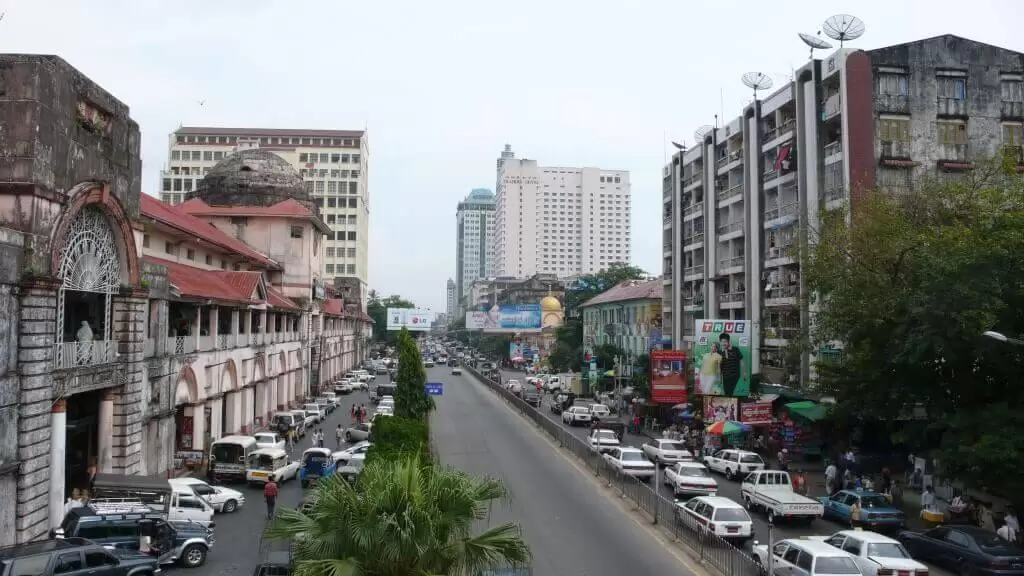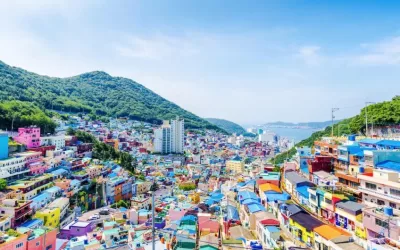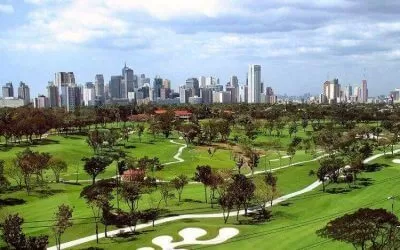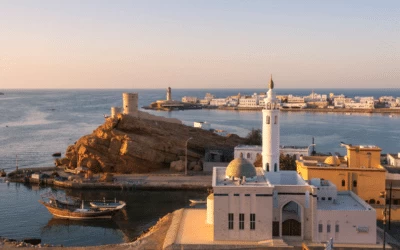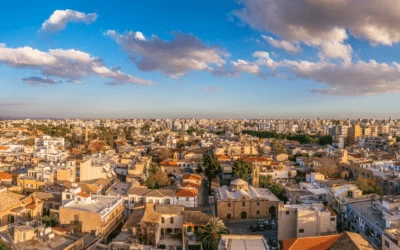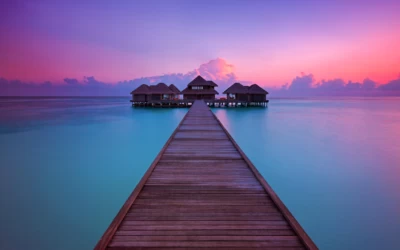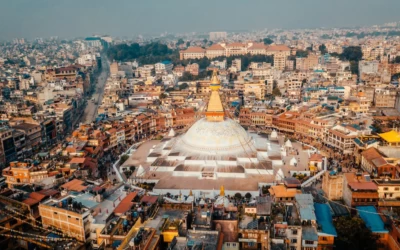Last updated April 9th, 2022.
People often think of Myanmar when anyone mentions “frontier markets” in Asia. This Southeast Asian country is indeed a perfect example of the region’s rise as a whole. Meanwhile, investing in Myanmar’s property market could soon offer healthy returns.
The media have exemplified Myanmar’s story of political and economic reform during the past decade – and for good reason too. Myanmar is now changing in a way rarely seen anywhere else, and its property market could benefit immensely from this transformation.
Formerly known as Burma, Myanmar was one of the world’s most oppressive dictatorships up until the Saffron Revolution in 2007. Soon after this revolution, Myanmar held its first free election since the mid-20th century.
Multiple international observers closely watched the election. They widely considered it fair with no signs of corruption or foul play.
Because of that fact alone, Myanmar has come a long way since the mid-2000s. Transforming from a military junta into a democracy (even if still a highly imperfect one) is an impressive feat to accomplish in such a short period.
During that time, the country enjoyed one of the fastest growth rates on the planet. Myanmar saw annual GDP growth of 12% in 2007. Its economy expanded by above 6% on average since then, completely ignoring the 2008 Global Financial Crisis which the rest of the world suffered.
Skipping recessions is rather typical of frontier markets. By their nature, frontier markets grow quickly, are less correlated with the global economy, and are often not as affected by problems abroad.
Even putting aside the progress that Myanmar has made, it also has natural advantages which are hard to ignore. Bordering both India and China, Myanmar boasts a strategic location right between nearly 3 billion people.
As these two superpowers inevitably rise, Myanmar is in a perfect position to benefit from the increased trade, transportation needs, and economic influence of China and India.
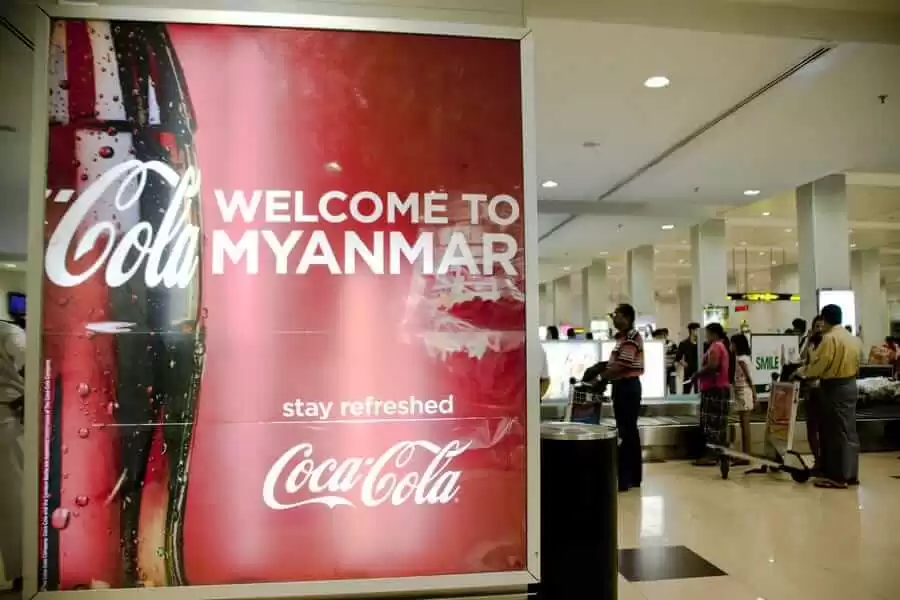
Coca-Cola and Nike are some of the many large companies that are practically tripping over themselves to invest in Myanmar.
Investors have taken note of all the factors mentioned above. “How can I invest in Myanmar?” is actually one of the most common questions InvestAsian gets from our readers and clients.
Yet while international firms are setting up shop throughout the country, it’s not easy to invest in Myanmar if you don’t have tons of money like Samsung and Unilever do.
In fact, it’s virtually impossible to buy stocks or freehold real estate in Myanmar as a foreigner. That’s despite the fact that current laws allow for, it and most required government institutions are already set up.
One of the best examples of this is Myanmar’s stock exchange, which only has five listings and almost zero foreign investment.
Corruption is rampant, bureaucracy is thick, and investors have few options for right now. But Myanmar is heading toward the right direction and foreign investors will undoubtedly have an easier time.
We will nonetheless explore the investment options that are currently available in Myanmar. This guide will also be updated as the country opens up more to foreigners.
Myanmar truly is the last frontier in Asia – at least until North Korea finally opens up to foreign property buyers. Staying informed about Myanmar’s real estate market is thus important if you’re a serious investor in the region.
Can Foreigners Buy Myanmar Real Estate?
Back in 2016, Myanmar passed a law that allows foreigners to buy condominium units in their own name. The law was modeled after Thailand’s and lets foreign buyers own up to 40% of the condo building’s total project space.
However, a building has to be registered under the condominium law in order to qualify in the first place. Since the law was just implemented in 2016, it’s barely enough time to register and develop an entire project under Myanmar’s condo act.
This essentially means foreigners can’t buy property in Myanmar right now – even though laws technically allow for it.
Like many things in Myanmar, this will almost inevitably change. The fact that a foreign condo law got passed in the first place is a step in the right direction, putting Myanmar above several other countries in Asia.
Places such as Indonesia and Vietnam, for example, don’t allow foreign freehold property ownership. Period.
Granted, it’s only been three years and shouldn’t take much longer before foreigners can claim to have successfully bought condos in Myanmar. But you might want to sit on the sidelines and wait for the dust to settle before buying real estate in Myanmar regardless.
More developed countries like Thailand even sometimes have issues with construction quality. So it’s probably worth seeing which companies materialize as reputable builders before buying property in Myanmar.
I cannot, in good faith, suggest becoming a lab rat and dealing with an uncertain legal framework in a frontier property market. You have better investment options than Myanmar nearby in Asia.
How Much are Property Taxes in Myanmar?
For non-resident foreigners in Myanmar, rental income is taxed at a progressive rate based on your annual income.
Tax rates range between 0% and 25% although the salary of most foreign investors should put them at the very upper end of that range.
Stamp duty is also payable on rental income after a tenant moves out and rates depend on the rental period. For terms less than one year, no tax is payable. Rates are 1.5% of average annual rent for periods between one and three years and 3% for periods over three years.
In practice, this tax is rarely collected by the authorities. Nobody ever bothers asking for it and few Burmese landlords pay stamp duty on rental income.
Lastly, there’s a stamp duty upon selling any real estate and transferring it to the buyer. If your property is located in Yangon, the rate is a hefty 7% of its total sale value. The tax rate is 5% for homes outside of Yangon.
Of course, none of this really matters since foreigners can’t buy real estate in Myanmar. These tax rates will probably stay relevant once you finally can though.
Best Cities to Invest in Myanmar Property
Myanmar is one of the most unexplored and least developed countries in Asia. Because of this, along with the fact that a condominium law was just recently passed, there are not many cities where foreigners are likely to buy property in the future.
Let’s face it: you’re not even really able to purchase real estate in Yangon yet, let alone in less developed areas like Mandalay, Taunggyi, or Bago.
A likely outcome is that a plethora of condo projects in Yangon will pop up before other cities in Myanmar are up for your consideration.
For the purposes of this guide, we’ll therefore only cover Yangon – Myanmar’s largest city by an order of magnitude. Yangon’s metro area includes over seven million inhabitants, and it’s growing quickly.
You can’t buy property in Myanmar as a foreigner yet. But with several condo buildings already under construction, it’s only a matter of time before people are investing in Yangon.
For now, we’ll talk about investing in Yangon’s real estate market from the perspective of a local, Burmese property buyer. We otherwise wouldn’t have much of a guide, right?
Myanmar is gradually opening up to foreign investment. But until it does, statistics and information as it relates to locals is the best anyone can do.
Nonetheless, our guide should prove useful and give you a head start when foreigners can eventually buy freehold property in Myanmar.
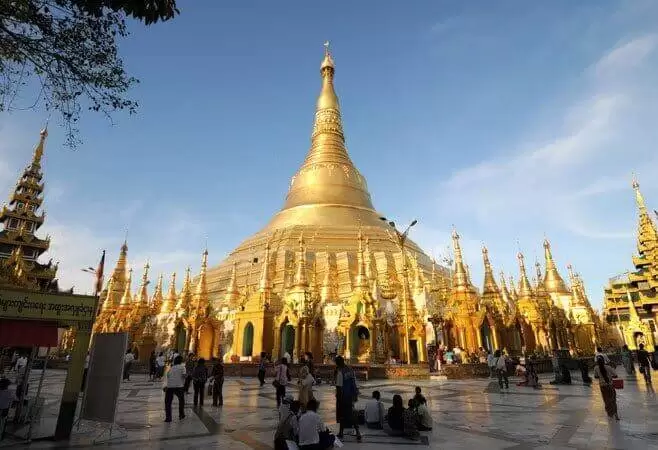
Myanmar’s iconic Shwedagon Pagoda is among the world’s most ornate temples. The nation’s economy should benefit from a continued rise in tourism.
Yangon
Formally known as “Rangoon” in English, Yangon is Myanmar’s bustling commercial center and largest city. It was also Myanmar’s capital up until very recently. The capital moved to Naypyidaw, a newly-built master planned city, back in 2006.
Yangon is also the only place in Myanmar that should fully allow foreign property ownership over the next several years.
The nation’s condo law just came into effect a few years ago and future investment options are not exactly clear. But it makes perfect sense that Myanmar’s first properties eligible for foreign ownership will be in the country’s most populous city.
Currently, sale prices in Yangon are absurdly high and almost certainly within bubble territory. Rental rates are about $80 per square meter in the central business district (CBD). That’s even more expensive than average rental prices in Singapore!
By the time foreigners are able to buy and own freehold property in Myanmar, will prices have come down? We don’t have the answer to that question.
Yet just like Myanmar’s legal system and economy are in a constant state of change, this guide is too. Let’s take a look at several of the townships in Yangon where local property investors are buying up real estate.
Dagon Township
Dagon is a township located just to the northwest of Kyauktada – the city’s political center and most popular area for tourists. It’s quickly becoming popular for expats and wealthy locals due to its close proximity and easy access to downtown.
Buildings and infrastructure close to Yangon’s center are typically old and built were during the British colonial area. However, there’s a bit more space for new construction out in Dagon. This means better roads and more desirable living conditions than other areas of the capital.
Those factors, combined with Dagon boasting some of Myanmar’s top schools, hotels, and embassies makes it one of the city’s most desirable areas to live.
If real estate prices rise in Yangon, then Dagon Township (along with the rest of central Yangon) should be among the city’s neighborhoods that will benefit most.
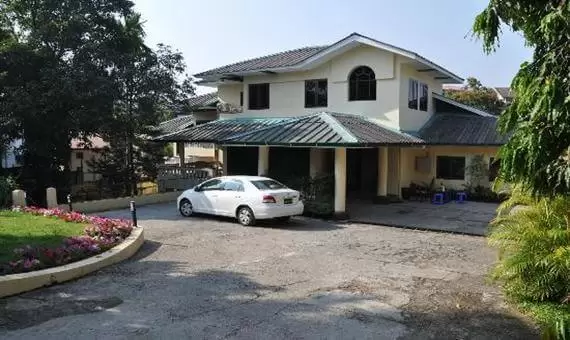
You can find western-style homes like these in Bahan. It’s certainly different compared to most types of housing in Yangon.
Bahan Township
A bit further north from downtown than Dagon is, the township of Bahan is more popular with wealthy locals than for expats. Regardless, Bahan is a rather prosperous suburb that shares many of Dagon’s ideal traits.
While not quite as central, Bahan lacks the bustle and noise found in areas near downtown. It’s possible to own (or in the case of foreigners right now, rent) larger homes suitable for an expat family. You also have the benefit of more greenery and a lake out here in Bahan.
Since Bahan is one of the few areas in metro Yangon where you’re able to live a fairly secluded, western lifestyle, it should become even more popular with expats in the future.
You could easily make an argument that Bahan is the “Beverly Hills of Yangon”. But is buying real estate here a better investment than in Southeast Asia’s other upscale neighborhoods, like Thonglor in Bangkok or Bonifacio Global City (BGC) in Manila? That’s a tough question.
Botataung Township
The township of Botataung is more central than either of the last two – even if just slightly. It’s part of downtown Yangon, barely 500 meters away from City Hall and the famous Sule Pagoda.
Because of its central location, Botataung will go through more construction and development than most other townships in Yangon. A commercial center filled with skyscrapers is starting to form and lots of foreign businesses expanding into Myanmar are setting up shop in this area.
Right now, Botataung is quiet compared to most other central business districts in Asia. This is caused by a combination of Yangon’s ban on motorcycles, along with the fact that your typical Burmese local doesn’t have much of a reason to be here.
Other Yangon Neighborhoods
Yangon is a sizable city of over seven million people in its metro area and rising quickly. There are far more than the three townships discussed previously – in fact, Yangon has exactly 33 of them.
The main problem is that many of these areas, especially the outer suburbs, lack basic services such as electricity and clean water. They definitely won’t be seeing condominium buildings and apartments anytime soon.
Consequently, there’s no need for discussion about these other neighborhoods in our Myanmar real estate guide.
Is Buying Myanmar Property a Good Investment?
Absolutely not. Even if foreigners were able to buy real estate in Myanmar, which they should be allowed in the near future, bureaucracy remains thick while property values in central Yangon are way too high.
Quite frankly, I couldn’t recommend for anyone to buy property in Myanmar at the moment. Your opportunity costs of not investing in better markets like Cambodia, the Philippines, or Vietnam is simply too high.
It’s possible that real estate prices in Yangon will drop to an appropriate level in the next few years. This guide will be updated once foreign ownership options increase and Myanmar’s economy develops further.
Until then, consider investing in countries like Cambodia if you’re seeking exposure to frontier market real estate. You should achieve similar returns (and superior yields) with far less hassle when compared to Myanmar’s property market.
Skip the Next Western Recession
Learn the best places to invest - and where to avoid - by downloading our free Investment Cheat Sheet.

